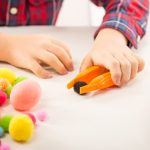 If your toddler is like most, he’ll love digging into your food storage container cabinet. Through the eyes of a little one, there’s so much to explore in there. To him, your containers double as noisemakers, pirate ships, doll beds, or blocks – endless possibilities.
If your toddler is like most, he’ll love digging into your food storage container cabinet. Through the eyes of a little one, there’s so much to explore in there. To him, your containers double as noisemakers, pirate ships, doll beds, or blocks – endless possibilities.
There are also plenty of benefits involved in letting your toddler stack, bang, and race the containers on the kitchen floor that move far beyond the fun of play. When it comes to development, food storage containers are excellent “toys” (and free!). In fact, many of the activities in our BabySparks program can be done using food storage containers.
Highlights:
|
The Benefits of Playing with Food Storage Containers
Yes, playing with your food storage containers will inevitably leave a mess behind. But, it’s kind of amazing how much learning your toddler can do with a few containers of different sizes and shapes and some imagination. This type of play develops:
Fine motor skills.
As soon as your toddler grasps a container, he uses the muscles in his fingers, hands, and wrists. These muscles work together to develop fine motor skills, which he’ll need later for tasks like writing, opening jars, and brushing his teeth.
Your toddler will likely use storage containers in various ways. This could be as simple as banging them on the floor or as challenging as trying to stack them on top of one another. If he’s picking them up, turning them over, or moving them around, he’s building fine motor skills.
Problem-solving skills.
Food storage containers are different shapes and sizes, making them perfect for building problem-solving skills that pave the way for learning more complex math concepts. Your toddler will try to stack containers on top of one another, nest them inside each other, and experiment with knocking them over. He’ll probably twist and turn square containers to try to fit them inside circle containers or attempt to count them by pointing to them and saying numbers or making noises.
Imagination.
Older toddlers will enjoy pretending that containers are something else, like race cars or houses. You might see your toddler using them as blocks to build a tower or pretending they’re pots to cook food in.
Imagination and pretend play tie in with problem-solving and flexible thinking because they help children learn to think differently about situations and problems. Creative thinking is also important for social-emotional learning that will help your toddler interact and empathize with others.
But First, Safety!
Your food storage container cabinets might contain other objects that aren’t so safe for play. It’s a good idea to designate one low cabinet a safe zone for your toddler. Check that this cabinet doesn’t have splintered wood, exposed nails, or anything else that could be dangerous for little hands or mouths to explore.
Then, double-check your containers. Keep all glass storage containers in a different cabinet, giving your toddler plastic ones to play with. Also, remove any worn-down plastic containers that might have rough or sharp edges.
Who knew that your kitchen cabinets could hold so many learning opportunities for your toddler?








